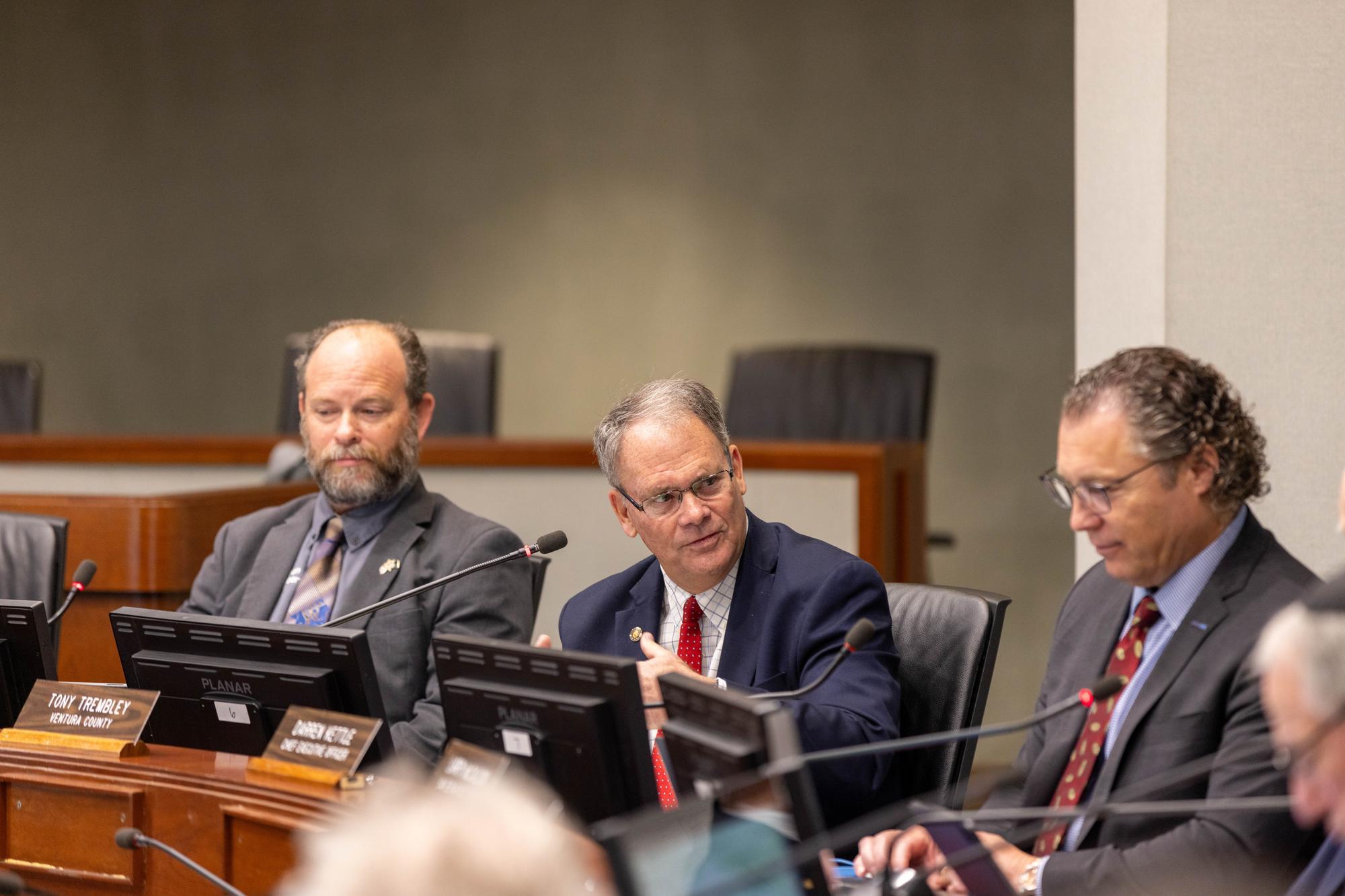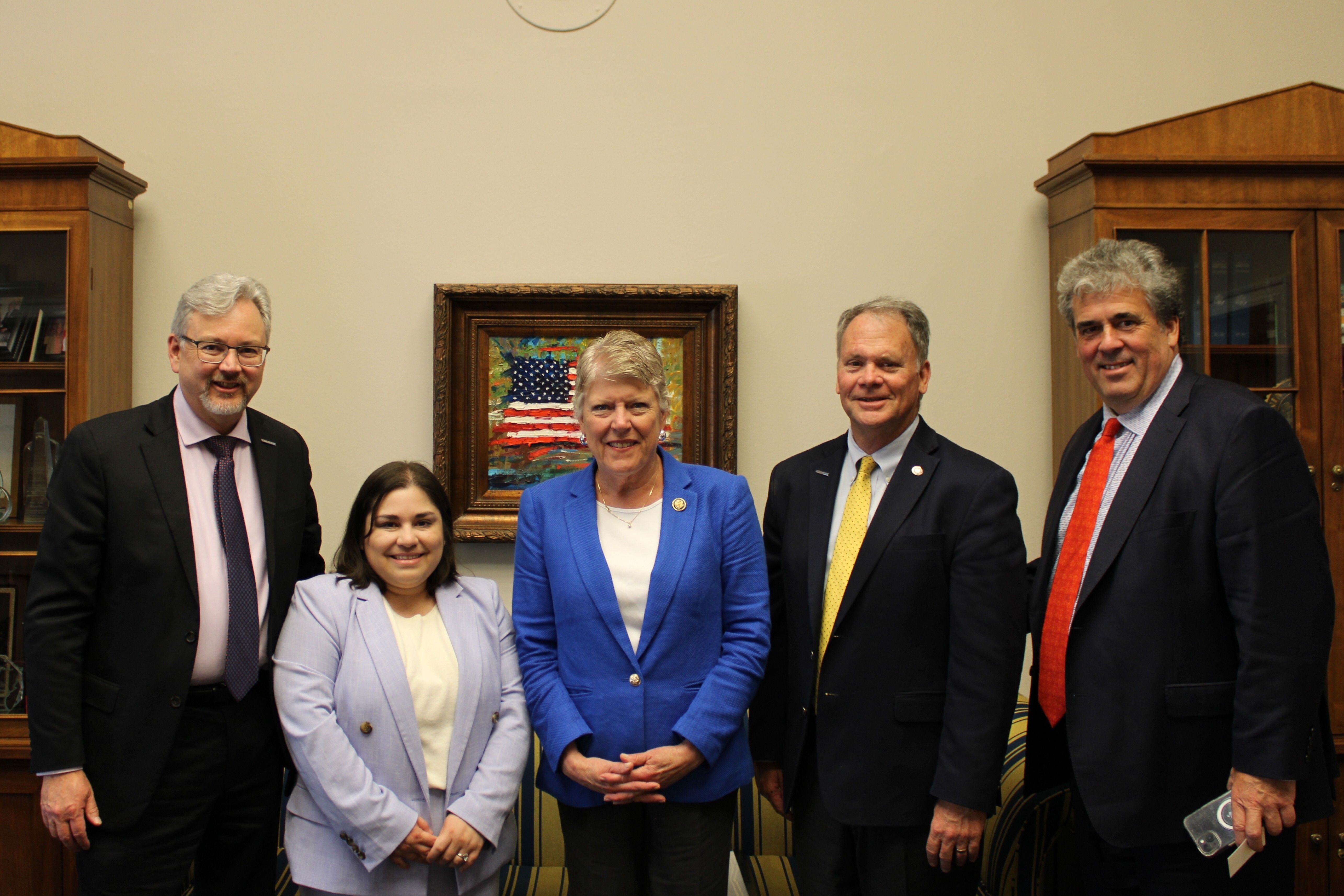
Metrolink Board Second Vice-Chair and Camarillo City Councilmember Tony Trembley (center) takes part in a board meeting with CEO Darren Kettle (right) and Board Vice-Chair and Jurupa Valley Mayor Brian Berkson (left).
This month, we connected with Metrolink Board Second Vice-Chair and longtime public servant Tony Trembley. As a Camarillo City Councilmember, Trembley has taken on regional and statewide leadership roles that are shaping the future of public transit, including his work with the Ventura County Transportation Commission and membership on Metrolink’s Olympics Ad Hoc Committee for the 2028 Olympic and Paralympic Games. He is a tireless advocate for expanding access to transit, ensuring fiscal responsibility and preparing the region for the opportunities ahead.
Trembley emphasized the need for robust and reliable regional transportation and discussed how European models that encourage transit-first decision-making offer practical lessons for U.S. systems. He also shared the leadership principle that guides his work both inside and outside the boardroom: “Service Above Self.”
1. In addition to being Second Vice-Chair for Metrolink’s Board of Directors, you also serve on the Board of the Ventura County Transportation Commission. How important a lifeline do you find public transportation to be for Southern California?
Public transportation is critically important for Southern California residents without access to private vehicles, or who desire to make their business and leisure travel easier. During the COVID-19 pandemic, Metrolink served as a lifeline for essential workers. Post-COVID, Metrolink has transformed into a regional (not just commuter) rail system and has become more important for all types of travel, including leisure activities. Why endure the hassle of using your car—especially for long drives—when you can easily take Metrolink and other forms of public transportation within Southern California?
2. How have you been involved in supporting preparations for the 2028 Olympic and Paralympic Games?
I’m one of two Directors on Metrolink’s Ad Hoc Board Committee for LA28. I first voiced concern at the Board in late 2023 about needing adequate lead time and preparation for offering efficient and adequate service, and even more importantly offering service which will be fiscally responsible (to Southern California taxpayers who are here after the Games). I’ve advocated on Metrolink’s behalf (including requests for financial assistance) both locally in Los Angeles and in Washington, D.C. It is a huge undertaking.

Second Vice-Chair Trembley and members of Metrolink’s Strategy Department meet with Congresswoman Julia Brownley (CA-26) during a trip to Washington, D.C. From left: Metrolink Chief Strategy Officer Paul Hubler, Metrolink Management Analyst Julie Nieto, Rep. Brownley, Trembley and Metrolink Director of Government and Community Relations Jeff Dunn.
3. You attended university at Trinity College in Dublin, Ireland. What was transportation culture like during your studies abroad, and how does that experience influence your approach to public transportation in Southern California?
Generally speaking, public transportation and, in particular, rail travel are deeply ingrained in the European public. For many, if not most, individuals, it’s their first choice. When you are standing in the middle of major rail stations/transit centers in Europe (e.g., Rome, London, Madrid, Paris, etc.), it is amazing to witness literally thousands of daily riders using train and bus travel. Sure—many individuals use private vehicles—but the ease of public transportation for most Europeans is compelling and offers a lesson for us in the United States.
4. You have a deep background as a lawyer in general counsel representation of public agencies, specializing in environmental issues. Metrolink was the first American rail system to power its fleet using renewable fuel, and just this month became the first American rail system to operate a hybrid-hydrogen-powered vehicle for passenger service. Why is it important that Metrolink continues to lead in this area?
It’s important for Metrolink to demonstrate to the public that renewable and clean fuels are available and to provide an environmentally, fiscally responsible, and efficient way of conducting operations. And we’re doing it.
5. If you could offer one piece of leadership advice to the region’s future leaders, what would it be?
Simply put, it’s the Rotary motto: Service Above Self. Commit yourself to serving others at least a few hours (if not more) per week. Whether it’s volunteering with a local nonprofit, helping in church activities, or being active in a service club—and these are only a few examples—your experience will not only connect you with others, but also provide you with experience and knowledge about others and the challenges we all face in society. Along with other traits, this is critical to becoming an effective leader.

